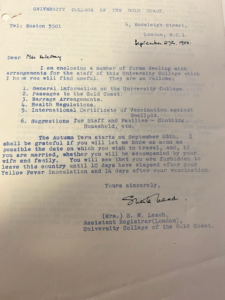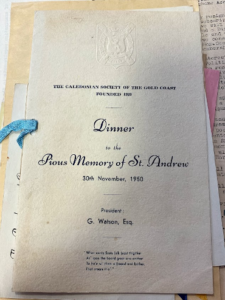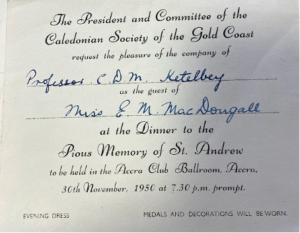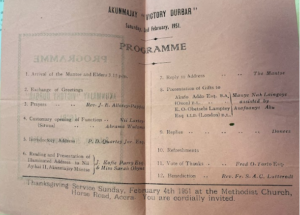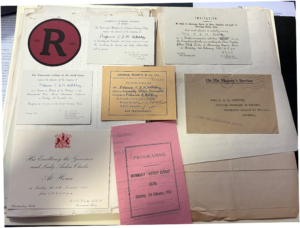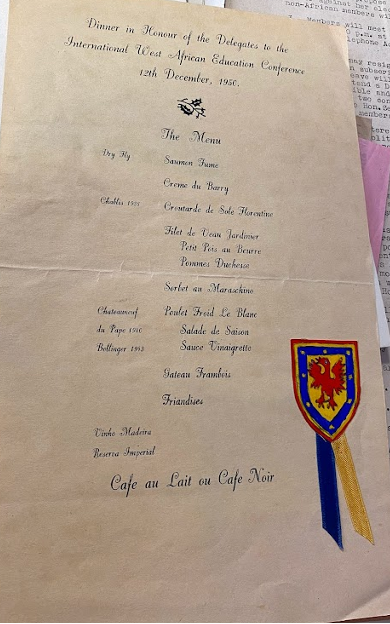Doris Ketelbey in the Gold Coast
One of the most fascinating periods of Doris Ketelbey’s life is the six months she spent working in the British occupied Gold Coast from 1950-1951. Ever a historian at heart, Ketelbey saved a large collection of letters and relevant paperwork from her time overseas and donated it to the University of St Andrews Library prior to her death. Most of the information in this blog post is drawn from those papers.
Going to Ghana
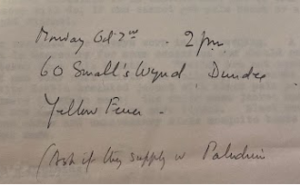
Ketelbey’s letters tell us that before flying to Achimota, Ghana, she needed to complete several tasks. This included having a medical examination, a vaccination for Yellow Fever (see right), Smallpox and most likely a Typhoid vaccine as well.
Furthermore, before travelling to the University College, Ketelbey was required to meet with Professor Bellot and Professor Penson of the University of London, who both were a part of the Council of the University College of the Gold Coast who appointed her. In a handwritten letter to Ketelbey, Professor Bellot says that he is ‘delighted’ to learn of her appointment in the Gold Coast to ‘tidy them up’, saying that the department ‘need [you] badly’ (see below).
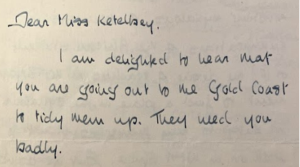
The letter included left gives an indication of how Ketelbey’s journey to Ghana may have been atypical for a woman.This is due to the line in this letter which says: ‘if you are married, [will you] be accompanied by your wife and family’. The suggestion here is therefore that the academic travelling to the Gold Coast will be a man, which makes Ketelbey’s appointment all the more interesting and impressive.
Bernice Hamilton
At the heart of the collection are a series of letters to Ketelbey from Mrs Bernice Hamilton, the Acting Head of the University College of the Gold Coast History department. Educated at LSE, Hamilton worked as a researcher both with the British Government and at various Universities until 1948, after which she took up a position in the Gold Coast. These letters from Hamilton provide an insight into the opportunities available to white, educated, women in the colonies and demonstrate the female-centric networks which were emerging in the professional world in the 1950s. Hamilton and Ketelbey shared a mutual acquaintance in Doreen Tulloch, a woman whom both had worked with in some capacity prior to 1950. Hamilton uses this shared connection to open her first letter to Ketelbey, emphasising their similarities, before detailing the current conflicts over curriculum she was engaged in with her colleagues and pre-emptively requesting Ketelbey as an ally.
Curriculum
The Hamilton letters provide an access point through which the conflict surrounding the creation of a new curriculum for the University, the very task which Ketelbey had been hired to solve, can be analysed. The tensions centred around the relative prevalence of African vs European history in the syllabus, and although Hamilton encouraged Ketelbey to support her argument that European history should take priority, Ketelbey was not entirely convinced. She took an active interest in the history of the Gold Coast, and consistently advocated for the employment of a Professor whose purpose was to ‘lecture in Modern European or Colonial or African History’ and to continue the ‘research into African and Gold Coast History’ which Ketelbey had already started. She also signed off on a proposal for the employment of ‘An African, (by race)’ who would specialise in research into the history of Africa.
Ketelbey’s more bureaucratic role in the development of the curriculum was to act as a point of contact between the University College and the University of London, to facilitate collaboration on the creation the curriculum. In one set of meeting minutes, she is specifically thanked for her work – ‘The Principal expressed the thanks of the Board to Professor Ketelbey for her part in the negotiations which had resulted in the proposed syllabuses.’
Her role in the department
Ketelbey appeared to be a esteemed member of the Gold Coast history department. In personal correspondence she is treated with respect, and there appears to be a consensus that she was appropriately qualified to take a leading role in the academic shaping of the department. Her appointment as Professor was also a sign of respect, as it was a signifiacnt promotion from her position at St Andrews. She was clearly proud of the title, as in one notable example she crosses out the ‘Miss’ preceding her name on a typed document and replaces it with ‘Prof’. 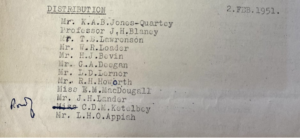
As a historian she was particularly interested in the Gold Coast and started an oral history research project into the area. There is a document noting her call for participants. The letter notes that ‘the personal recollections of living people, especially elderly men ones, would be particularly welcomed’.
Social life
In November 1950, Ketelbey was granted ‘Honorary Membership of Convocation’, giving her access to academic meetings and proceedings.
She was also involved in two social clubs whilst in the Gold Coast: The Accra Women’s Dining Club, and the Caledonian Society of the Gold Coast. The former consisted of nine members, plus an additional 15 ladies ‘invited to become members’, including Ketelbey. Professor Ketelbey (as she was known in the Gold Coast) appears to be a popular and valued member of the Women’s Dining Club, as demonstrated in her letters from Mrs Ann Rendall, the honorary secretary, who signed off a letter ‘with love’. Mrs Rendall wrote how ‘we will all enjoy listening to you’, implying that Ketelbey was due to talk to the Women’s Dining Club. The existence of this club, and Ketelbey’s active role during her stay, once again demonstrates the existence of female networks in academic circles.
The second of the social clubs Ketelbey was involved with was the Caledonian Society of the Gold Coast. On the 30th of November 1950, she was invited by the club to attend a ‘Dinner to the Pious Memory of St. Andrews’, rather fitting considering her home town and University career.
Ketelbey kept hold of a number of additional documents demonstrating her avid social life whilst at the Gold Coast, including a programme for a Thanksgiving Sunday Service and a menu for a dinner she attended ‘in honour of the Delegates to the International West African Education Conference’ (see photos below).

